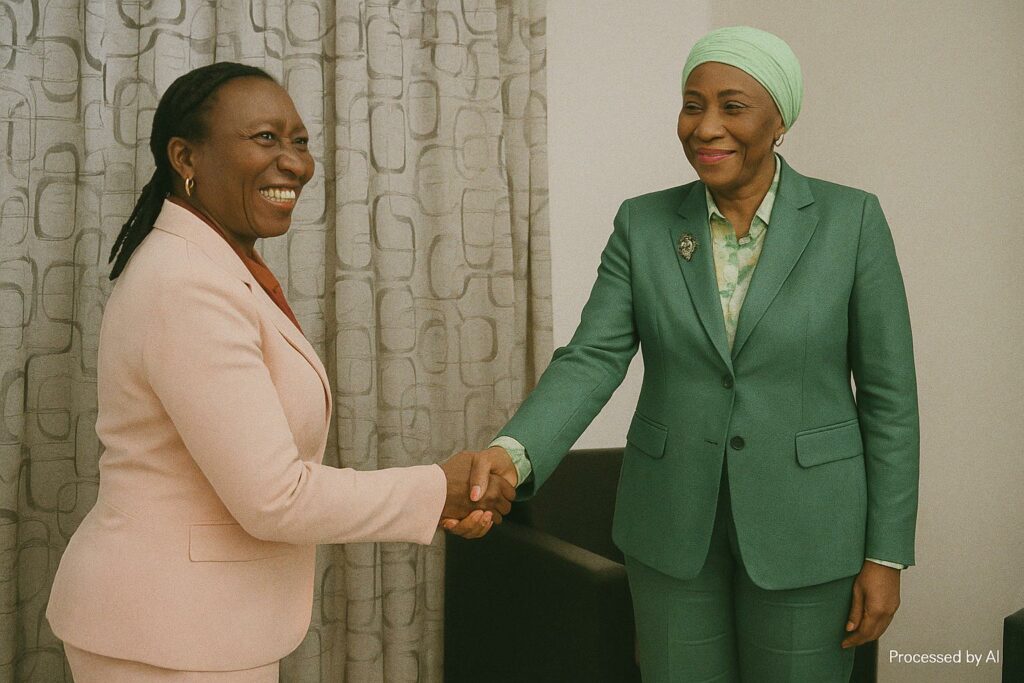Diplomatic Signals From Brazzaville
The visit of Ambassador Laura Evangelia Suárez to the headquarters of the Congolese Ministry of Transport offered more than the courtesies normally associated with bilateral protocol. Her exchange with Minister Ingrid Olga Ghislaine Ebouka-Babackas served to activate the agreements initialled during the first Congo-Venezuela Joint Commission held in Caracas in October 2023. At that time, both delegations quietly appended signatures to three memoranda covering port governance, merchant shipping and reciprocal air services. Until now the texts had rested in the archives of the two administrations, awaiting the political impetus that often distinguishes paper commitments from operational projects.
Historic Ties, Contemporary Calculus
Congo-Venezuela relations trace their institutional origin to the mid-twentieth-century Non-Aligned Movement, yet economic cooperation remained marginal, confined largely to multilateral fora within OPEC and the United Nations. The present rapprochement must therefore be read against a backdrop of converging priorities. Brazzaville seeks to reduce logistical costs that burden its non-oil exports, while Caracas is navigating a gradual reintegration into global trade despite continuing United States sanctions. According to regional shipping data consulted by the author, West-Central African ports currently handle less than one per cent of Venezuelan outbound cargo. Even a modest uptick would translate into additional dockage fees and freight revenue for the Congolese corridor centred on Pointe-Noire.
Port Synergies and the Gulf of Guinea
Congolese planners view their deep-water facility of Pointe-Noire as a pivotal node for hinterland supply chains reaching the Central African Republic, northern Angola and the Katangan mining belt. Venezuelan expertise in bulk terminal management, acquired in the Orinoco River cluster, is regarded in Brazzaville as transferable know-how that could accelerate the port’s transition into a regional trans-shipment hub. A senior official at the Congo Ports and Harbours Agency, requesting anonymity, underscored that “Caracas has mastered the art of operating in silt-heavy estuaries, a competence highly relevant to the sediment dynamics of the Kouilou basin.” Such technical complementarities underpin the cautious optimism expressed after the July meeting.
Skies of Opportunity: Civil Aviation Prospects
The aviation chapter of the bilateral accord envisages code-sharing arrangements between Equatorial Congo Airlines (ECAir) and Conviasa, Venezuela’s state carrier. Industry analysts note that the two airlines share a fleet configuration centred on narrow-body aircraft, facilitating cost-effective rotation on potential Brazzaville-Caracas routes with intermediate technical stops in North Africa or the Canary Islands. Beyond passenger traffic, refrigerated cargo holds could carry Congolese horticultural produce and Venezuelan agro-processed goods, responding to diversification imperatives repeatedly articulated by both governments. The Congolese Civil Aviation Authority has already dispatched a technical mission to Caracas, a detail confirmed by communiqués issued in late June.
Women and Small Business in Trade Diplomacy
Ambassador Suárez’s symbolic gift of artisanal chocolate and the honey branded “Miel de femme” was more than diplomatic flourish. It signalled an intent to position women-led enterprises at the heart of the nascent corridor. In a region where gender parity initiatives frequently remain declaratory, the emphasis on tangible products manufactured by female entrepreneurs brings a pragmatic edge to the narrative. Minister Ebouka-Babackas, who previously steered the Ministry of Planning, echoed the sentiment by recalling that Congo’s 2022-2026 National Development Plan allocates dedicated credit lines to women-owned start-ups. Such policy consonance enhances the likelihood that the maritime and aviation agreements will incorporate inclusive procurement clauses.
Navigating Constraints and Future Scenarios
Several operational constraints nonetheless hover on the horizon. Funding for port retrofitting remains contingent on concessional loans or blended finance, arenas in which both countries continue to negotiate with multilateral lenders. On the aviation front, insurance premiums for airlines transiting the Atlantic under Venezuelan registration may fluctuate in response to evolving sanctions jurisprudence. Yet diplomats on both sides appear convinced that geopolitical fluidity can translate into opportunity. A Venezuelan official close to the dossier observed that “the South-South vector is regaining traction as traditional lanes fragment.” Congolese interlocutors, for their part, highlight the prospective utilisation of the Cabinda Gulf as a bunkering station for Venezuelan tankers, thereby knitting together maritime and energy logistics without overshadowing the diversification agenda.
A Calculated Convergence
The July dialogue in Brazzaville did not generate dramatic headlines, yet its cumulative significance lies in the methodical layering of technical cooperation upon a foundation of shared strategic imperatives. Both capitals are intent on signalling that they possess options beyond the confines of their respective traditional partners. Should feasibility studies mature into tangible investment decisions, Congo stands to consolidate its position as a logistics gateway to Central Africa, while Venezuela could reopen commercial avenues that circumvent the chokepoints of the Caribbean basin. In the words of a senior Congolese diplomat, “It is not a pivot away from anyone; it is a pivot toward ourselves.” Such phrasing encapsulates the self-reliant ethos animating this emerging river-to-runway partnership.

